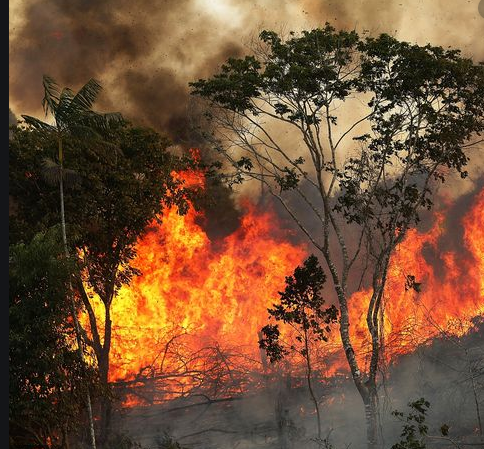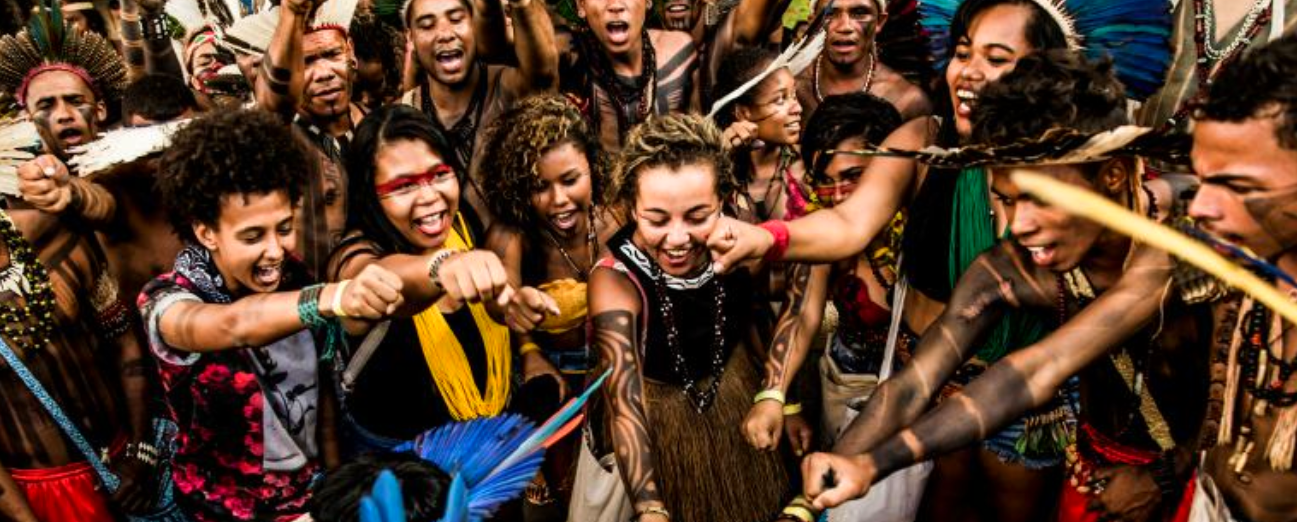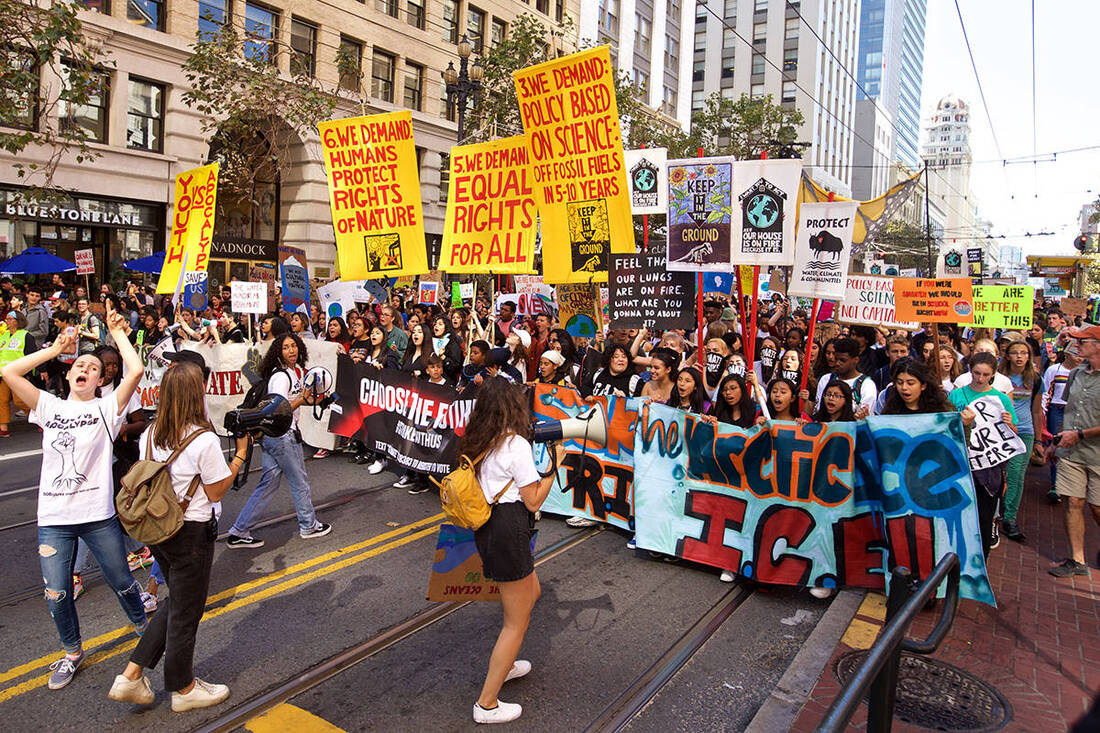"When are people going to start fighting with, and for the indigenous populations suffering most from the greed propelling such devastation, rather than arguing about our use of plastic straw?"
--Judith Hernandez, 10th grade
Rainforests are vital to our planet. They help regulate the global climate and are home to both animals and people. The Amazon rainforest is the largest rainforest in the world and produces one-fifth of the earth’s fresh flowing water. This August, the Amazon rainforest began to burn uncontrollably, with the total number of fires rising to over 46,000. So, how did these fires start?
Increase in temperature and use of fossil fuels plays a large role in the recent fires reported around the world and overall state of our planet. As humans and consumers of energy, our day-to-day actions also contribute to the destruction caused by climate change. Recent media coverage of this destruction and our role in it has opened up conversations regarding the use of materials such as plastic straws and the types of light bulbs we should be using. Although these factors contribute to global climate, they do so at a much smaller rate. So, when are we going to start questioning how often we let these conversations prevent us from holding those in power accountable and larger actions we have the responsibility to take?
Many are pointing the blame to Brazil’s new President, Jair Bolsonaro. Bolsonaro “has championed industries that want greater access to protected areas of the Amazon, sought to weaken the land rights of Indigenous people and scaled back efforts to combat illegal logging, ranching and mining,” reports the New York Times. The Guardian adds, “Bolsonaro has been accused of helping stoke the crisis by encouraging invasions of protected reserves with his promises to develop the Amazon, and force his vision of progress on indigenous peoples.” Under Bolsonaro’s tenure as president, trees have been cut down, chemicals have gone into their rivers, and lives have been threatened simply because of Bolsonaro’s goal towards “developing” the Amazon. It is clear that many of the reasons behind the destruction of the Amazon rainforest were caused by more than just human contribution to pollution, but also on-going hatred towards indigenous people and Bolsonaro’s abuse of power. But how does the mining and deforestation actually impact the people living in the Amazon and the rest of the world?
According to Amazonwatch.org, “more than 3,500 fires have been detected across 148 indigenous lands,” a fact of which many are unaware. However, many around the world are also choosing to ignore this fact, despite inidgenous peoples communicating the fires with the public long before they began to burn uncontrollably. Many of these indegenious peoples soon became victims of this fire.
These communities are actively calling out to stop the deforestation of their land and mining that brought chemicals to the rivers they use to survive. In response to the chaos of the land, Raoni Metuktire, an environmentalist and chief of the indigenous Brazilian Kayapo writes, “We have set aside our divided history to come together. Only a generation ago, many of our tribes were fighting each other, but now we are together, fighting together against our common enemy. And that common enemy is you, the non-indigenous peoples who have invaded our lands and are now burning even those small parts of the forests where we live that you have left for us,” in an article published in The Guardian.
Increase in temperature and use of fossil fuels plays a large role in the recent fires reported around the world and overall state of our planet. As humans and consumers of energy, our day-to-day actions also contribute to the destruction caused by climate change. Recent media coverage of this destruction and our role in it has opened up conversations regarding the use of materials such as plastic straws and the types of light bulbs we should be using. Although these factors contribute to global climate, they do so at a much smaller rate. So, when are we going to start questioning how often we let these conversations prevent us from holding those in power accountable and larger actions we have the responsibility to take?
Many are pointing the blame to Brazil’s new President, Jair Bolsonaro. Bolsonaro “has championed industries that want greater access to protected areas of the Amazon, sought to weaken the land rights of Indigenous people and scaled back efforts to combat illegal logging, ranching and mining,” reports the New York Times. The Guardian adds, “Bolsonaro has been accused of helping stoke the crisis by encouraging invasions of protected reserves with his promises to develop the Amazon, and force his vision of progress on indigenous peoples.” Under Bolsonaro’s tenure as president, trees have been cut down, chemicals have gone into their rivers, and lives have been threatened simply because of Bolsonaro’s goal towards “developing” the Amazon. It is clear that many of the reasons behind the destruction of the Amazon rainforest were caused by more than just human contribution to pollution, but also on-going hatred towards indigenous people and Bolsonaro’s abuse of power. But how does the mining and deforestation actually impact the people living in the Amazon and the rest of the world?
According to Amazonwatch.org, “more than 3,500 fires have been detected across 148 indigenous lands,” a fact of which many are unaware. However, many around the world are also choosing to ignore this fact, despite inidgenous peoples communicating the fires with the public long before they began to burn uncontrollably. Many of these indegenious peoples soon became victims of this fire.
These communities are actively calling out to stop the deforestation of their land and mining that brought chemicals to the rivers they use to survive. In response to the chaos of the land, Raoni Metuktire, an environmentalist and chief of the indigenous Brazilian Kayapo writes, “We have set aside our divided history to come together. Only a generation ago, many of our tribes were fighting each other, but now we are together, fighting together against our common enemy. And that common enemy is you, the non-indigenous peoples who have invaded our lands and are now burning even those small parts of the forests where we live that you have left for us,” in an article published in The Guardian.
The indigenous people’s fight hasn’t ended, leading many to ask: when are people going to start fighting with, and for the indigenous populations suffering most from the greed propelling such devastation, rather than arguing about our use of plastic straws?
Similarly to Raoni Metaktire, many other indigenous people have been reaching out through articles but also protests and movements. Their voices and chants are filled with desperation, anger, and power they refuse to surrender. Their people are being threatened, their homes are being destroyed right in front of them, and the earth they are so heavily connected to is in the process of vanishing. Awareness needs to be spread about the reality of the constant destruction to the planet and violence towards the people that often get left out of this ongoing conversation. The earth and our lives as humans are in deep trouble so our ignorance shouldn’t be a reason why the damage we’ve already caused continues to deteriorate.
Many organizations aim to raise money and attention in order to protect the land. Amazon Watch is a nonprofit organization founded that protects the rainforest and advances the rights of indigenous peoples in the Amazon Basin. “[They] partner with indigenous and environmental organizations in campaigns for human rights, corporate accountability and the preservation of the Amazon's ecological systems,” which means they also encourage people to get involved.
Similarly to Raoni Metaktire, many other indigenous people have been reaching out through articles but also protests and movements. Their voices and chants are filled with desperation, anger, and power they refuse to surrender. Their people are being threatened, their homes are being destroyed right in front of them, and the earth they are so heavily connected to is in the process of vanishing. Awareness needs to be spread about the reality of the constant destruction to the planet and violence towards the people that often get left out of this ongoing conversation. The earth and our lives as humans are in deep trouble so our ignorance shouldn’t be a reason why the damage we’ve already caused continues to deteriorate.
Many organizations aim to raise money and attention in order to protect the land. Amazon Watch is a nonprofit organization founded that protects the rainforest and advances the rights of indigenous peoples in the Amazon Basin. “[They] partner with indigenous and environmental organizations in campaigns for human rights, corporate accountability and the preservation of the Amazon's ecological systems,” which means they also encourage people to get involved.
There are also nationwide protests happening more consistently that are always in need for more voices to chant. On September 23rd, one of the largest strikes in world history took place nationwide. Greta Thunberg, Autumn Peltier, Mari Copeny, and hundreds of other young activists, many of which are around us, are encouraging everyone partake in this movement.
This conversation is bigger than plastic straws and the types of light bulbs we use so it is time we start changing it.
This conversation is bigger than plastic straws and the types of light bulbs we use so it is time we start changing it.




